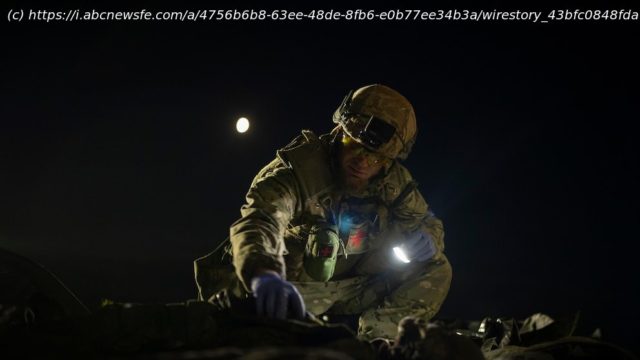Oleksii Yukov says the same thing to all the mothers: We will bring your dead children home
The smell in the car is sick and sweet, the overpowering scent of corpses that have lain too long in muck and ruin, the ones the dogs didn’t devour. Oleksii Yukov, a 38-year-old martial arts instructor who leads a team of volunteer body collectors in Ukraine, doesn’t notice.
He is on the phone with one of the mothers. She heard her son was injured in battle and left behind, but she’s not sure where.
“He was left to die and now they are telling me that ‘he died as a hero!?’” she says, choking out words between sobs.
“Don’t cry,” Yukov tells her. “Because if you get weak — no one will help him … Don’t cry in front of anyone! They are not worth it. Cry in front of the grave of your son only.”
“We will take everyone back,” he promised. “We just need some time.”
Yukov says the same thing to all the mothers. He tells them to talk about their dead children, so they will be remembered. There is one person in particular whose story Yukov does not want forgotten: Oleksandr Romanovych Hrysiuk — Sasha, to his mother, Olha.
In a cryptic voice message last year, Yukov urged Olha to tell Sasha’s story. “Not everyone has such a story,” he told her.
But he left out the most important part: What it had cost him to bring Sasha home.
The true toll of the war in Ukraine — and the odds faced by each side — can be measured in bodies.
More than half a million people have been killed or seriously injured in two years of war in Ukraine, according to Western intelligence estimates — a human toll not seen in Europe since World War II. The question of who prevails is being increasingly shaped by which side can tolerate higher losses.
By that measure, Moscow has the upper hand.
Analysts say it will be hard for Ukraine to outmatch Russian forces, which continue to grow despite hundreds of thousands of casualties, without significant resources from its international partners. But the U.S. Congress has not approved $60 billion in aid for Ukraine, even as soldiers at the front run low on ammunition.
“Putin is not running a democracy,” said Evelyn Farkas, a former senior Pentagon official for Russia and Ukraine who now heads the McCain Institute at Arizona State University. “Putin can afford to be more callous and disregard the body count.”
Ukrainian President Volodymyr Zelenskyy, on the other hand, is presiding over a more democratic system, “where the will of the people is actually the strongest component of their war machine.”
Russia had 3.7 times more men of fighting age than Ukraine in 2022, according to World Bank data. That means that though Russia has sustained nearly twice as many casualties as Ukraine, according to Western intelligence estimates, on a per capita basis Russia’s losses remain lower than Ukraine’s.
At current levels of recruitment, the Kremlin can sustain current attrition rates through 2025, according to an assessment by the Royal United Services Institute (RUSI), a think tank in London. Meanwhile, Ukraine this week took the politically difficult step of lowering the military conscription age from 27 to 25 in an effort to replenish its ranks.
“Manpower is another currency, » said Nick Reynolds, a research fellow at RUSI. “The Russians with their industrial base and larger manpower can expend manpower and materiel at less cost. »
Yukov understands that for people far away, war is geopolitics, death can be counted in numbers, and money matters more than men. But he knows better.
“War has one face,” he said. “Death and stupidity and horror.”
The last time Olha Hrysiuk spoke with her son, Sasha asked about the spring crops, the vegetable garden, their horses and cows, were the chickens laying many eggs? The conversation went on, as if they had all the time in the world. It was May 15, 2022.
Sasha vanished the next day.
For three days, Olha knew only silence. She accepted it, because Sasha had told her he was going on a mission and might be out of touch.
On the fourth day, she called the head of her village, who called the nearest military office, who contacted his military unit, who said that Sasha was missing.
Sasha wasn’t a born fighter. An athlete, he studied physiotherapy before he was drafted and packed off on April 3, 2022. Olha gave him a silver cross on a chain to hang around his neck as he went into battle.
Where was her boy now, she wondered, the kid with the sweet smile and ears that stuck out, who loved to run and had so many friends she couldn’t keep count? Where was her son, who dreamed of building a home for the family he did not yet have?
“In Ukraine, we have a saying that God takes the best away,” Olha said. “I think this is the case.”
After pleading on social media for information, Olha’s daughter-in-law managed to speak directly with some soldiers from Sasha’s unit.
They said Sasha was dead. They were very sorry they couldn’t take his body with them, the shelling was too heavy, all they could do was hide him in a cellar in Dovhenke — a rural settlement in eastern Ukraine that fell to the Russians. They would write his name on the shells they fired because they loved him too. He was a hero, they said.
Sasha, 27 years old, had lasted exactly six weeks at war. It was time for him to come home. If Olha couldn’t have her son back, she’d take whatever pieces were left.
But how?
Olha started making calls, so many that she had to buy a notebook to keep track. She said she called the Ukrainian Red Cross, the International Committee of the Red Cross, Ukraine’s National Information Bureau, the Ukrainian military, the Coordination Headquarters for the Treatment of Prisoners of War, every hotline and volunteer group she could find. She emailed the Commissioner for Human Rights and wrote letters to the Ministry of Defense and even to President Zelenskyy himself.
She wrote down who answered, who didn’t, and, mostly, who told her to wait, wait, wait. For six months, Olha tried.
“I just could not live without trying,” she said. “How is it possible to not even see the bones of your child! I was even ready to go to Dovhenke myself!”
In the end, people told her that if Black Tulip couldn’t bring Sasha home, no one could.






